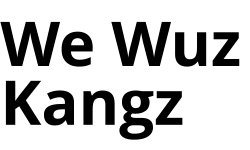In the ever-evolving world of internet culture, few memes have sparked as much discussion and controversy as “We Wuz Kangz.” To the untrained eye, the phrase might appear as nothing more than a humorous internet trope, but beneath its surface lies a deep layer of racial and historical discourse. To understand the meme’s cultural significance, we must dive into its origins, the context behind it, and the ways in which it reflects broader societal issues, particularly regarding race, history, and identity.
The Origins of “We Wuz Kangz”
The phrase “We Wuz Kangz” is a phonetic imitation of the phrase “We were kings.” It originated as a satirical and mocking response to discussions in certain online communities about the contributions of ancient African civilizations, particularly Egypt, to world history. These discussions are often led by Afrocentric scholars or individuals who emphasize the significance of African cultures in shaping ancient civilizations. The meme, often used to mock these perspectives, portrays exaggerated versions of Black individuals claiming all historical accomplishments as their own, regardless of historical accuracy.
Its most common usage occurs in forums, social media threads, and image boards where contentious historical debates take place. The misspelling and intentionally poor grammar of “We Wuz Kangz” is part of the mockery, suggesting that the people being satirized lack education or sophistication. Over time, the meme became a staple in alt-right and other reactionary online spaces, often weaponized to dismiss or belittle discussions on African history, race, or racial pride.
The Meme and Afrocentrism
Afrocentrism is a movement that seeks to center African people and their contributions to global history, culture, and philosophy. It challenges Eurocentric narratives that have often erased or diminished African achievements, particularly those in antiquity. One of the cornerstones of Afrocentric thought is the recognition that ancient Egypt, which produced some of the world’s most enduring architectural, scientific, and philosophical legacies, was an African civilization.
For centuries, Western scholars either denied or downplayed the African roots of Egypt, often depicting its people as being more closely related to Europeans or Middle Easterners than to sub-Saharan Africans. This denial ties into broader issues of racism and colonialism, where African cultures were deemed “inferior” and their histories erased or co-opted by European powers.
In reaction to this historical denial, some Afrocentric scholars have emphasized the Blackness of ancient Egyptians and, by extension, the idea that African civilizations were responsible for significant advancements in human history. This is where the meme “We Wuz Kangz” enters the conversation, mocking this position by implying that Afrocentrists claim ownership of all major historical achievements, regardless of context.
Satire or Racism?
While some argue that the “We Wuz Kangz” meme is simply satire, others recognize it as a tool used to undermine legitimate discussions about African history and Black identity. The humor of the meme often hinges on ridiculing Black people for being perceived as overly proud of their historical contributions, suggesting that their claims to a noble past are inflated or misguided.
Critics of the meme argue that it serves to reinforce racist stereotypes. By suggesting that Black people are “pretending” to have been kings or pharaohs, the meme subtly (or not so subtly) implies that Black people have no meaningful historical legacy to claim. This fits into a broader pattern of denying the significance of African civilizations in global history and perpetuates a narrative that African peoples have contributed little to world progress.
In online spaces, where discussions about race are often polarized and toxic, “We Wuz Kangz” becomes a shorthand for dismissing any attempt to recognize African achievements in history. It plays into the hands of those who want to maintain Eurocentric or white supremacist interpretations of history, where Africa is often depicted as a “dark continent” devoid of civilization until Europeans arrived.
The Broader Implications of the Meme
The rise of the “We Wuz Kangz” meme speaks to a broader trend of using humor as a means of maintaining racial hierarchies and reinforcing stereotypes. Internet culture, particularly meme culture, has become a battleground for these ideas. What might appear as “just a joke” can have far-reaching implications when used to perpetuate harmful ideologies.
The impact of such memes isn’t limited to humor or satire. They influence perceptions of race, history, and identity, especially for younger generations who consume large amounts of information (and misinformation) online. When memes like “We Wuz Kangz” spread, they shape the discourse around race, often reducing complex discussions about history and culture to mockery and derision.
For some, the meme may serve as a way to challenge what they see as historical revisionism or overreach in claims of African accomplishment. But for many others, it is a reminder of how deeply ingrained racism can be, even in something as seemingly benign as a meme. It reveals how certain sections of the internet use humor to silence or belittle minority voices and histories.
Reclaiming the Narrative
In response to the “We Wuz Kangz” meme, many have called for a more nuanced and accurate understanding of African history. Ancient Egypt was indeed a significant African civilization, and it should be acknowledged as such without falling into the traps of overgeneralization or exaggeration. Afrocentrism, at its core, seeks to correct historical inaccuracies and give proper credit to African civilizations, but like any movement, it must be careful not to fall into the same traps of historical revisionism that it seeks to correct.
Moreover, the discussion about African achievements should not be confined to ancient Egypt alone. The African continent is home to a rich tapestry of civilizations, from Nubia to Great Zimbabwe, from the Mali Empire to Carthage, that contributed immensely to global history. Recognizing this broader context helps avoid the pitfalls of focusing too narrowly on one civilization while ignoring others.
Conclusion: Beyond the Meme
The “We Wuz Kangz” meme may seem like harmless internet humor, but it reflects deeper societal issues about race, identity, and history. It is a reminder that memes, while often humorous, can carry significant ideological weight. They can be tools for reinforcing stereotypes, perpetuating ignorance, or even spreading hate.
The best way to counter such memes is through education and understanding. By engaging with African history in a respectful and accurate way, we can move beyond reductive internet humor and appreciate the true complexity and richness of global history. In doing so, we honor not just African civilizations but all peoples who have contributed to the human story.







